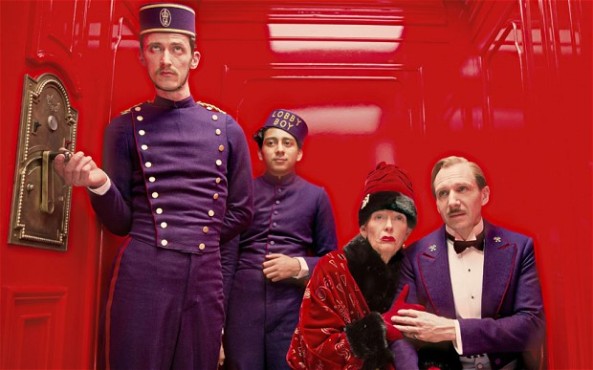Wes Anderson has been making Wes Anderson movies his entire career; no one quite does it better (though many have tried). They’re rife with perfectly precise miniatures of colorful, excrutiating detail, and over the years his set dressing has conveyed kitsch, adolescence and cartoons.
“The Grand Budapest Hotel” may be the most Wes Anderson-y film yet. Its title character M. Gustave (Ralph Fiennes) embodies the fastidious perfectionist with an eye for fashionable excellence in a way that no other Anderson character has captured the director’s true sense of style. It’s a silly, sinister and sneaky caper that thrives on its careful construction.
Gustave is the concierge of the Grand Budapest Hotel in the fictional Eastern European country Zubrowska in 1932. Years later after war has forever affected the majesty of the region and the hotel itself, we meet Zero Mustafa (F. Murray Abraham) regaling his days as a young lobby boy (Tony Revolori) under Gustave’s tutelage.
Fiennes is wonderful as an eloquent and aloof manager and womanizer, quick witted in his authority and charmingly blunt to the elderly women he beds. His prize is Madame D. (an almost unrecognizable Tilda Swinton under pounds of makeup), a wealthy maiden who suddenly turns up murdered, but not before bequeathing a priceless painting to Gustave. As a result, Gustave soon finds himself on the run from Madame’s vindictive son (Adrien Brody) and the authorities (led by a hilariously out of place and without an accent Edward Norton).
The story’s eccentricities are a gleeful façade for the more forlorn and nostalgic themes of death, murder and fading glory. It’s not unlike the aesthetic Anderson employs, one that shimmers due in part to its artificiality. In one moment Gustave waxes poetic about the beauty and goodness in mankind, but before finishing his thought concedes, “Oh fuck it.”
Anderson follows the same trajectory in the film’s style. By film’s end, the film’s color will have faded, the more familiar aspect ratio will have returned in present day, and a little girl will sit in a wintery cemetery reading about The Grand Budapest’s past beauty.
These ideas sometimes get lost in Anderson’s complicated caper and chase set pieces. The film scurries between jail cells, empty prairies, ornate churches and cartoonish ski slopes before finding its way back to the colorful confines of the hotel, and part of the fun of the film is the delicate dance of classic Anderson-isms like dangling from heights, rapid sight gags and clever miniature props. It revels in its construction more so than the campy quaintness of “Moonrise Kingdom’s” climax or “Fantastic Mr. Fox’s” zany mayhem.
And although Anderson has taken up so many of his own calling cards in order to make a statement about the type of filmmaker he is, he finds himself in still new territory with room for experimentation. In one scene he plays with shadows and depth of focus in ways new to him during a chase inside a museum (a big nod to Hitchcock’s “Torn Curtain”). He’s even grown out of the straight dead pan broad strokes that defined his early films, adopting more screwball comic timing and elements of surprise. The film’s biggest laugh comes in gangster Willem Dafoe’s last moments.
Since “Moonrise Kingdom”, Anderson director has been elevated to genius status, with ever growing box office potential and an ability to attract anyone in Hollywood to work with him. If that film helped him prove that his films can have a heart, “The Grand Budapest Hotel” has proved just how in control of his movies he can be. It may not be the “best” Wes Anderson movie, but surely it is the “most.”
3 ½ stars

It’s definitely his most ambitious for sure. May not be his best, however, that doesn’t matter when all your movie consists of is having an absolute great time. Good review Brian.